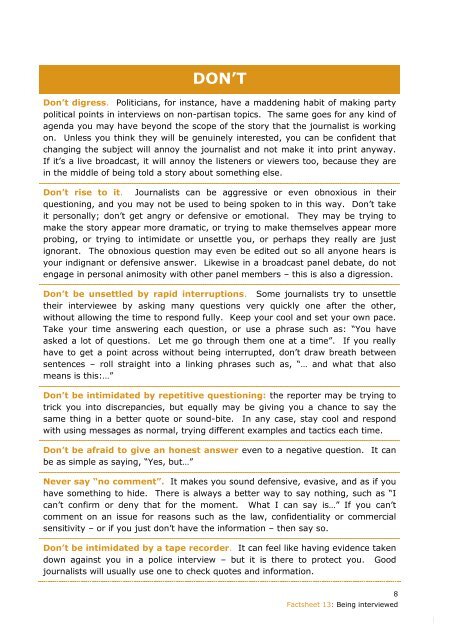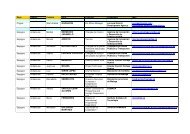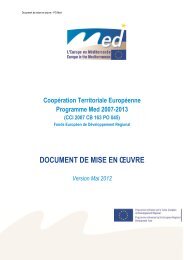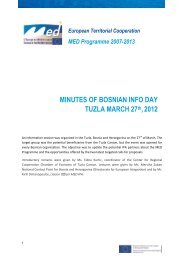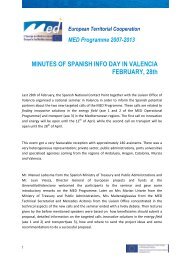MED Communication Handbook - Programme Med
MED Communication Handbook - Programme Med
MED Communication Handbook - Programme Med
You also want an ePaper? Increase the reach of your titles
YUMPU automatically turns print PDFs into web optimized ePapers that Google loves.
DON’T<br />
Don’t digress. Politicians, for instance, have a maddening habit of making party<br />
political points in interviews on non-partisan topics. The same goes for any kind of<br />
agenda you may have beyond the scope of the story that the journalist is working<br />
on. Unless you think they will be genuinely interested, you can be confident that<br />
changing the subject will annoy the journalist and not make it into print anyway.<br />
If it’s a live broadcast, it will annoy the listeners or viewers too, because they are<br />
in the middle of being told a story about something else.<br />
Don’t rise to it. Journalists can be aggressive or even obnoxious in their<br />
questioning, and you may not be used to being spoken to in this way. Don’t take<br />
it personally; don’t get angry or defensive or emotional. They may be trying to<br />
make the story appear more dramatic, or trying to make themselves appear more<br />
probing, or trying to intimidate or unsettle you, or perhaps they really are just<br />
ignorant. The obnoxious question may even be edited out so all anyone hears is<br />
your indignant or defensive answer. Likewise in a broadcast panel debate, do not<br />
engage in personal animosity with other panel members – this is also a digression.<br />
Don’t be unsettled by rapid interruptions. Some journalists try to unsettle<br />
their interviewee by asking many questions very quickly one after the other,<br />
without allowing the time to respond fully. Keep your cool and set your own pace.<br />
Take your time answering each question, or use a phrase such as: “You have<br />
asked a lot of questions. Let me go through them one at a time”. If you really<br />
have to get a point across without being interrupted, don’t draw breath between<br />
sentences – roll straight into a linking phrases such as, “… and what that also<br />
means is this:…”<br />
Don’t be intimidated by repetitive questioning: the reporter may be trying to<br />
trick you into discrepancies, but equally may be giving you a chance to say the<br />
same thing in a better quote or sound-bite. In any case, stay cool and respond<br />
with using messages as normal, trying different examples and tactics each time.<br />
Don’t be afraid to give an honest answer even to a negative question. It can<br />
be as simple as saying, “Yes, but…”<br />
Never say “no comment”. It makes you sound defensive, evasive, and as if you<br />
have something to hide. There is always a better way to say nothing, such as “I<br />
can’t confirm or deny that for the moment. What I can say is…” If you can’t<br />
comment on an issue for reasons such as the law, confidentiality or commercial<br />
sensitivity – or if you just don’t have the information – then say so.<br />
Don’t be intimidated by a tape recorder. It can feel like having evidence taken<br />
down against you in a police interview – but it is there to protect you. Good<br />
journalists will usually use one to check quotes and information.<br />
8<br />
Factsheet 13: Being interviewed<br />
�


